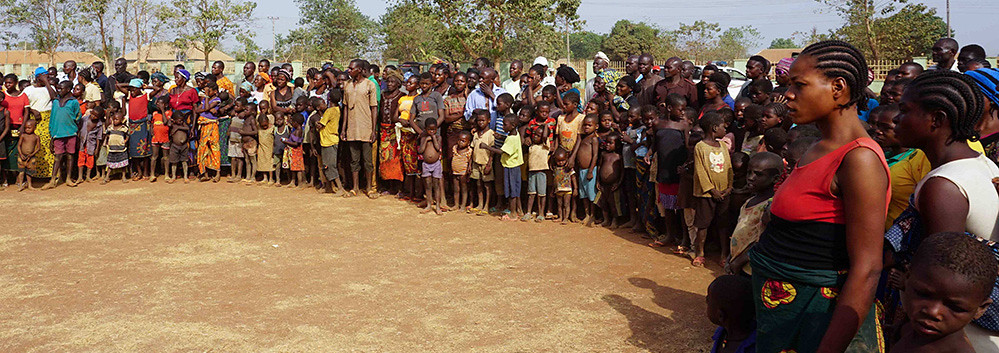Genocide in Nigeria: over 6,000 massacred Christians and media silence in the West
Many people in Western countries are ignorant, because their media and politicians do not talk about it, that there is an anti-Christian genocide in Nigeria perpetrated by Islamists.
The majority of murdered Christians are women and children
The Christian Post published on July 3 that over 6,000 Christians, mostly women and children, have been killed since January by Islamists in Nigeria. Most of the crimes are being perpetrated in the center and in the north of the country, and take place at night and surprisingly. The murderers belong to the Nomadic ethnic group of the Fulani, with a Muslim majority, and are considered to be the fourth most dangerous terrorist group in the world, a list headed by another Islamist criminal group that has perpetrated numerous attacks on Christians in Nigeria: Boko Haram. One of the worst attacks occurred between June 22 and 24, when four militias of Fulani terrorists attacked the towns of Barkin, Ladi, Bokkos and Riyom in the Plateau state, massacring more than 200 people.
Christians denounce an ethnic cleansing they call genocide
The Christian communities of Nigeria, both Catholic and Protestant, have denounced that the attacks are aimed at carrying out an ethnic cleansing in order to expel the Christians from their lands, and they are already talking about genocide, since the Rome Statute of the the International Criminal Court thus qualifies acts "committed with intent to destroy, in whole or in part, a national, ethnical, racial or religious group". The Christians of Nigeria also criticize the inaction of the Nigerian president, the Muslim Fulani Muhammadu Buhari. On May 22, Nigerian Catholics demonstrated in Lagos demanding justice for the murdered and their families, headed by the Catholic Archbishop of Lagos, Monsignor Alfred Adewale Martins. At the end of June, the Catholic bishop of Gboko, William Avenya, warned that in Nigeria there is a risk of a repeat of the genocide that occurred in Rwanda against the Tutsi in 1994. Bosun Emmanuel, of the Brotherhood of Catholic Men in Lagos, has pointed out that in 25 years Christians can disappear from Nigeria if the current persecution continues.
Western media: between silence and manipulation
Most Western media is not reporting on this anti-Christian genocide in Nigeria. Some media that do give news of what happened do, in addition, disguising the massacre. On June 25, the Spanish progressive newspaper El País described the massacres in the Plateau state as "clashes", hiding the mention of Christians in the penultimate paragraph of the news. In the rest of the text he refers to them as "farmers", without more. More grotesque has been the Argentine digital Infobae, which has spoken of "the massacre between Muslims and Christians." In the text of the news the headline is false: "A group of nomadic shepherds of the Fulani ethnic group, mostly Muslims, are the main suspects of traveling in groups of between 20 and 30 motorcyclists the fields of the so-called "green belt" of Nigeria, killing the peasants, mostly Christians." The news reaches the absurdity of attributing the crimes to "climate change", and even affirms that "the difference between Muslims and Christians has also contributed to increase violence," as if the victims were to blame for the massacres for their religion.
In the same line, the BBC published a story with this title: "Making sense of Nigeria's Fulani-farmer conflict." British television bet on the equidistance between the perpetrators of the massacres and their victims, avoiding giving figures about them, talking as little as possible about the Christian religion of the victims and even justifying that the Fulanis carry weapons of war as AK-47 assault rifles "to protect their livestock." The news even affirms that the Fulani "are also sometimes attacked and have their animals stolen by bandits, prompting brutal reprisals." I do not want to imagine how the BBC would report today on the genocide of Armenian Christians at the hands of Turkish Muslims.
|
Don't miss the news and content that interest you. Receive the free daily newsletter in your email: Click here to subscribe |
- Most read
- The 'hole' without civil flights around Paris during the opening of the Olympic Games
- Spain vetoes the Russian frigate 'Shtandart', which intended to reach Vigo, in all its ports
- The interior of the Statue of Liberty torch and the sabotage that canceled its visits
- The ten oldest national flags in the world that are still in use today
- The BNG boasts of the support of a terrorist group and a dictatorship at a public event
- The Russian intelligence document that sparked a hoax about French troops
- A virtual tour of ancient Rome in full color, just as it was in its heyday

 ES
ES





Opina sobre esta entrada: